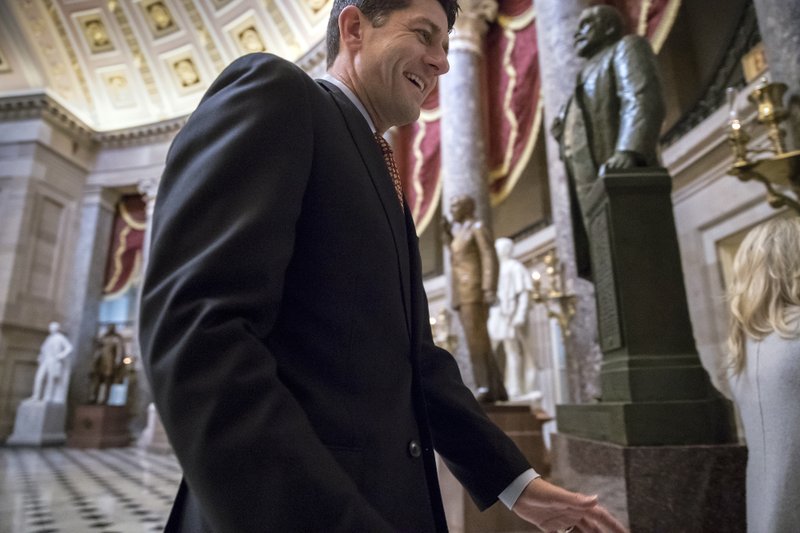WASHINGTON -- House Speaker Paul Ryan said Republicans are discussing whether their tax plan should include a repeal of the requirement that people have health insurance coverage or face a penalty, a step pushed by President Donald Trump.
It would be another shot at further undermining the Patient Protection and Affordable Care Act after repeated failures by the GOP-led Congress to repeal and replace the law, as Trump has demanded and Republicans promised would happen after President Barack Obama left office and Republicans ran Washington.
The House Ways and Means Committee was set to begin work on the tax rewrite today, with the goal of full House consideration next week. The committee chairman, Rep. Kevin Brady, R-Texas, has said including a repeal of the health law's individual mandate would be politically risky, given that the Senate has failed to pass health legislation in Trump's first year.
Ryan, R-Wis., told Fox News Sunday that "a lot of members are suggesting" that the House include the repeal, though he did not weigh in personally on how to deal with the coverage mandate.
Equally as evasive was the second-ranking House GOP leader: "Well, I know people are talking about it," Rep. Kevin McCarthy, R-Calif., said on CBS' Face the Nation. He added: "Look, my focus is on tax. As the individual mandate goes, I would not be opposed to that. But I want to see this bill go forward."
The Congressional Budget Office has estimated that repealing the individual mandate would save $416 billion over a decade as people stop buying government-supported health insurance. The mandate provides a powerful incentive for people to get coverage before health problems arise. But the money represents a tempting revenue source for GOP tax-writers whose tax plan would add an estimated $1.5 trillion over 10 years to the national debt.
Rep. Mark Meadows, the chairman of the House Freedom Caucus, told ABC's This Week that revenue counted through the repeal could in turn be used to soften the blow from the expiration of various tax credits and elimination of the deduction for state income and sales taxes.
"We're advocating on behalf of that," said Meadows, R-N.C.
Trump tweeted last week: "Wouldn't it be great to Repeal the very unfair and unpopular Individual Mandate in ObamaCare and use those savings for further Tax Cuts for the Middle Class."
Rep. Peter King, R-N.Y., said on ABC that "we should confine this to tax cuts and tax reform."
Some Republican lawmakers from New York and New Jersey have come out against the bill in its current form, saying that ending deductions for state and local sales and income taxes would hit their constituents the hardest.
Republicans talking up the tax bill on the Sunday shows played down concerns that the bill would add substantially to the nation's debt.
"Preliminary numbers really look very good in terms of economic growth. So, over a longer period of time, some 10 to 15 years, we believe that the economic growth will outweigh any short-term deficit increase that we see," Meadows said.
"These so-called budget hawks have turned into an extinct, endangered species," said House Democratic leader Nancy Pelosi of California during an appearance on CNN's State of the Union.
In examining the GOP's tax bill, Congress's Joint Committee on Taxation projected that the expiration of certain tax breaks would result in tax increases for some income groups in some years.
The bill would provide an immediate tax cut for all income groups -- with short-term benefits focused on middle-income earners, according to an analysis released by the tax committee. But by 2023, the changes would mean higher federal tax bills for some, including those who make between $20,000 and $40,000 and those who make between $200,000 and $1 million, according to the committee's analysis.
Meanwhile, households earning $1 million or more a year would see continued reductions -- and by 2025, that group would be getting the most benefit of any group studied, according to the tax committee.
While the committee didn't specify why benefits for lower earners would fade, the House bill would phase out some provisions that would tend to help them by 2023. For example, an enhanced child tax credit would expire that year.
McCarthy said Senate rules did not allow the House to make certain tax cuts permanent, "but I will promise you this: As the growth comes in, those will be kept," he said.
The House Ways and Means Committee responded to the tax committee's analysis with an extensive news release over the weekend that said the study "omits the economic effects" that the tax changes would create. Conservatives say the changes would spur faster economic growth that would lead to higher incomes.
Information for this article was contributed by Kevin Freking of The Associated Press; and by Sahil Kapur, Catarina Saraiva, Mark Niquette and Ben Brody of Bloomberg News.
A Section on 11/06/2017
